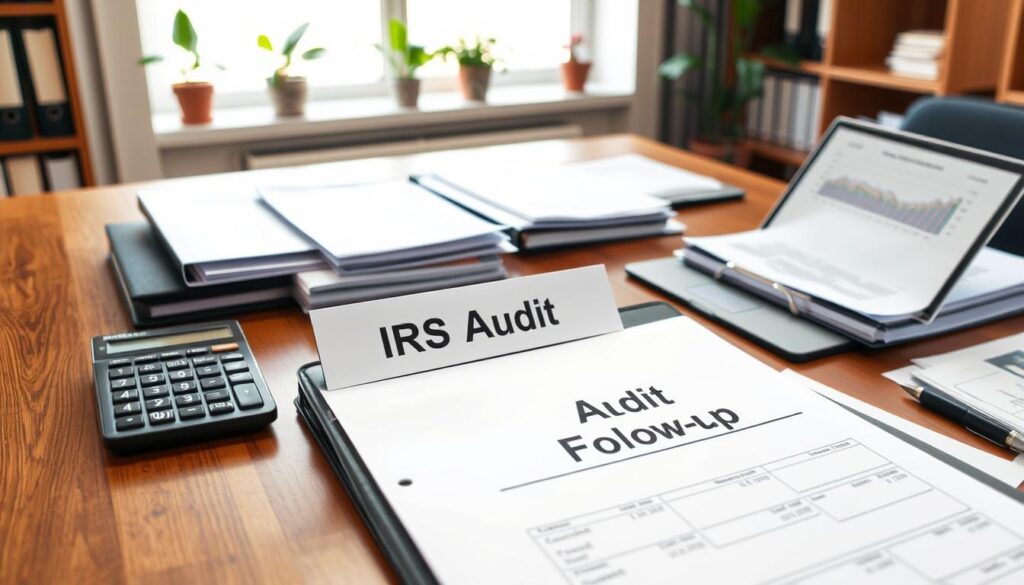Preparing for an IRS business audit can seem scary, but it’s manageable with the right steps. The IRS picks businesses randomly for audits using a formula. Knowing what might trigger an audit is key to being ready.
A business audit checks if your tax return is correct and follows the law. It can end in three ways: no changes, agreed changes, or disputed changes. Whether you run a small business or a big company, being ready for an audit is crucial to avoid fines.
The IRS outlines your rights during an audit in “Publication 1, Your Rights as a Taxpayer.” By 2026, the IRS will audit large corporations more often. But small businesses won’t see a big increase in audits soon. Knowing the different types of audits helps you prepare better.
Table of Contents
Key Takeaways
- Understanding the IRS audit process is crucial for a successful outcome.
- Various financial practices can act as small business tax audit triggers.
- The IRS uses a statistical formula for random selection of business returns for audits.
- Small businesses are unlikely to see a rise in audit rates in the near future.
- Preparing for a business audit can help avoid potential penalties or fines.
- The IRS publishes taxpayer rights during a business audit in “Publication 1, Your Rights as a Taxpayer.”
Understanding IRS Business Audits
IRS business audits are important to grasp. There are different types of audits and audit triggers that can lead to one. The IRS picks businesses for audits randomly or based on related examinations. Most audits cover returns from the last two years to ensure timely checks.
The IRS might audit returns from the last three years. They can add more years if there are big errors, not more than six years back. Audit triggers include wrong income statements, car and home office deductions. Businesses with losses in three of the last five years or with inflated expenses are also watched closely.
There are four types of audits: correspondence, office, field, and line-by-line. Correspondence audits are common, while line-by-line audits are rare. The IRS checks taxable income, losses, expenses, and deductions. Knowing the types of audits and audit triggers helps businesses get ready for an IRS business audit.
For more on audits and taxpayer rights, see Publication 1, Your Rights as a Taxpayer. By understanding the types of audits and audit triggers, businesses can prepare better for an IRS business audit. This ensures a smooth review process.
| Type of Audit | Description |
|---|---|
| Correspondence Audit | The most common type of audit, involving a letter from the IRS requesting information or documentation. |
| Office Audit | An in-person meeting with an IRS representative to review tax returns and documentation. |
| Field Audit | An on-site examination of a business’s records and operations. |
| Line-by-Line Audit | A detailed examination of every item on a tax return, typically used in cases of suspected tax fraud. |
Initial Steps When Receiving an Audit Notice
Getting an audit notice from the IRS can be scary. But, knowing the right initial steps can make things easier. First, you need to understand the notice and what it means. It will tell you the type of IRS audit, the tax years involved, and what documents you need to provide.
It’s important to know your rights as a taxpayer. You have the right to representation, to appeal, and to a fair audit. Many people find it helpful to talk to a tax professional, like an enrolled agent or tax attorney, for guidance.
Here are some important things to remember when you get an audit notice:
- Respond quickly to the notice and give the needed documents
- Understand the audit type and what to expect
- Know your rights and get help if you need it
By taking the right initial steps and getting professional help, you can handle the IRS audit confidently. This can help avoid penalties or fines.
| Type of Audit | Description |
|---|---|
| Correspondence Audit | Done by mail, where the IRS asks for more info or documents |
| Office Audit | Done at an IRS office, where you need to bring specific documents |
| Field Audit | Done at your home, business, or tax pro’s office, where agents check your financial records closely |
Essential Documentation You Need to Gather
When you’re getting ready for an IRS audit, it’s key to collect all the right documents. You’ll need financial statements like income statements and balance sheets. Also, you’ll need tax returns and any supporting documents.
The IRS wants certain audit documentation to check if your tax return is correct. This includes things like invoices and bank statements for income. You’ll also need expense records and receipts for deductions and credits.
Financial Statements and Records
Financial statements show your business’s financial health. They’re important for backing up your tax return. You should have:
- Income statements
- Balance sheets
- Cash flow statements
Tax Returns and Supporting Documents
Tax returns and supporting documents are key to proving your tax information is right. This includes:
- W-2 forms
- 1099 forms
- Receipts and invoices
Business Income Documentation
Documents for business income are crucial for your tax return. This includes:
- Invoices and receipts
- Bank statements
- Ledger accounts
Expense Records and Receipts
Expense records and receipts are vital for deductions and credits. This includes:
- Receipts for business expenses
- Invoices for business expenses
- Bank statements
| Document Type | Description |
|---|---|
| Financial Statements | Income statements, balance sheets, cash flow statements |
| Tax Returns | W-2 forms, 1099 forms, receipts and invoices |
| Business Income Documentation | Invoices and receipts, bank statements, ledger accounts |
| Expense Records and Receipts | Receipts for business expenses, invoices for business expenses, bank statements |
Creating an Organized Record-Keeping System
An effective record-keeping system is key for audit preparation. It helps businesses smoothly go through an IRS audit. A well-organized system makes sure all important documents are easy to find. This simplifies the audit process and reduces stress.
Some important documents to have in your system are:
- Gross receipts documentation, such as cash register tapes and invoices
- Expense records, including canceled checks and credit card receipts
- Asset documentation, such as purchase and sales invoices, and real estate closing statements
Keeping detailed and organized records is vital. It prepares businesses for an IRS audit. They can then provide all needed documents to back up their tax returns.
Setting up a record-keeping system is a crucial step in audit preparation. It helps businesses avoid problems during an IRS audit. Accurate and detailed records show compliance with tax laws. This lowers the chance of errors or issues during an audit.
| Document Type | Description |
|---|---|
| Gross Receipts | Cash register tapes, deposit information, receipt books, invoices, and Forms 1099-MISC |
| Expenses | Canceled checks, cash register tape receipts, credit card receipts, and invoices |
| Assets | Purchase and sales invoices, real estate closing statements, and canceled checks |
How to Prepare for a Business Audit by the IRS: Step-by-Step Guide
Getting ready for an IRS audit means knowing what to do and what to expect. A good audit preparation plan is key for a smooth audit. Start by doing a pre-audit check to find any issues or concerns.
A step-by-step guide to audit prep can guide businesses through it. This guide should cover getting financial records in order, looking at Audit Technique Guides (ATGs), and knowing the difference between mistakes and intentional actions that might lead to penalties.
Good communication planning is also vital. This includes knowing who to talk to and who will represent you during the IRS audit. By following these steps and being ready, businesses can lower the chance of penalties and have a good audit outcome.
Some important steps for an audit preparation plan are:
- Gathering and organizing financial records
- Reviewing applicable Audit Technique Guides (ATGs)
- Understanding unintentional vs. intentional actions that could result in penalties
- Consulting a tax professional
- Being prepared and professional on the audit date
Digital Record Management Best Practices
Effective digital record management is key for audit preparation, especially for an IRS audit. Scanning and digitizing financial documents like invoices and receipts helps. Storing them in a safe, easy-to-reach spot ensures all needed documents are ready and easy to find.
This method makes the audit process less stressful and simpler. It lets the IRS quickly ask for electronic backup files. These files help generate reports and check items further.
Some top tips for managing digital records include:
- Keep electronic records safe and easy to get to.
- Use electronic accounting software to make audits smoother.
- Make sure all electronic records are correct, complete, and easy to access.
By sticking to these tips, businesses can get ready for an IRS audit. They can also make it easier to get and share electronic records.
Working with Tax Professionals During an Audit
When you’re facing an IRS audit, having the right support is crucial. Tax professionals, like certified public accountants or tax attorneys, can offer expert help. They guide you through the audit process, protecting your rights and aiming for the best outcome.
Working with tax pros has many benefits. They know how to handle the IRS audit process well. They make sure you follow tax laws and represent your interests. They also explain the audit process, helping you prepare and avoid mistakes.
When picking a tax professional, consider their experience and reputation. Their communication style should match yours. The right professional ensures your audit goes smoothly and ends well.
| Benefits of Working with Tax Professionals | Description |
|---|---|
| Expert Audit Representation | Guidance through the IRS audit process |
| Compliance with Tax Laws and Regulations | Ensuring you meet all tax requirements |
| Representation of Your Interests | Protecting your rights during the audit process |
By getting help from tax professionals, your IRS audit will be handled well. You’ll get the best outcome possible.
Common Audit Examination Areas
IRS audits focus on specific areas. These include checking income, expenses, and assets. The aim is to make sure businesses report their finances correctly and follow tax laws.
Income verification is key. It means checking financial records to see if all income is reported right. This includes looking at financial statements and tax returns. It’s also important to review expenses to make sure they’re real and documented well.
Asset records are another focus. This means checking a company’s assets, like property and equipment. It’s to ensure they’re valued and depreciated correctly. Knowing these areas helps businesses prepare for audits and stay compliant with tax laws.
Maintaining Professional Communication with Auditors
Keeping professional communication with auditors is key for a smooth audit process. This means being quick to respond to their requests and providing clear answers. It’s also important to be respectful and courteous.
Understanding the roles of both the auditor and the taxpayer is crucial. This knowledge helps everyone involved in the process.
During an IRS audit, having accurate financial records is vital. Organizing these records can save time and money. Getting help from a tax professional can also make things easier.
Here are some tips for good communication with auditors:
- Choose one person to talk to the IRS for your business.
- Follow IRS instructions carefully and meet deadlines.
- Keep a record of all interactions with the IRS.
By following these tips, businesses can make the audit process smoother. This can help avoid penalties and interest. Remember, professional communication is essential for a successful IRS audit.
Rights and Responsibilities During an Audit
Knowing your rights and duties during an IRS audit is key for a smooth process. As a taxpayer, you can have a representative and appeal IRS decisions. It’s important to know these taxpayer rights to handle the audit process well.
In an IRS audit, you must give accurate and full information. You also need to cooperate fully. This means answering requests quickly and providing all needed documents. Knowing your duties helps finish the audit quickly and with less trouble for your business.
Some important rights and duties during an audit include:
- The right to challenge the IRS’s position and be heard
- The chance to give more documents in response to IRS actions
- The right to appeal to the IRS Appeals Office if you disagree with proposed changes
Knowing your rights and duties helps you deal with the audit better. It also protects your taxpayer rights. Always stay informed and get professional help if you need it for a good outcome.
| Right/Responsibility | Description |
|---|---|
| Right to Representation | The right to have a representative, such as a tax professional, present during the audit |
| Right to Appeal | The right to appeal any decisions made by the IRS |
| Responsibility to Cooperate | The responsibility to provide accurate and complete information, as well as cooperate with the audit process |
Addressing Discrepancies and Corrections
When dealing with an audit, it’s key to handle any issues quickly. This includes fixing missing documents, a big challenge. Keeping accurate records is crucial. This includes financial statements, tax returns, and supporting documents.
Audit problems can come from many places. This includes math mistakes, wrong deductions, or missing info. To fix these, clear explanations and documents are needed. This might mean changing financial statements, fixing tax returns, or adding more info.
To make the audit go smoothly, being proactive is important. This means:
- Providing clear and concise explanations for any discrepancies
- Offering supporting documentation to validate business decisions
- Addressing missing documents and providing alternative evidence when necessary
Being ready and quick to respond can make the audit less stressful. It helps solve problems more efficiently and effectively.
Post-Audit Procedures and Follow-Up
After an IRS audit, it’s key to follow post-audit procedures for a smooth process. This means responding to extra requests for info or documents. It’s also important to fix any mistakes or issues. Follow-up helps solve problems and avoid more trouble.
The IRS has three years to audit you. Most audits just ask for receipts or documents. But, a field audit needs a face-to-face meeting. To handle an audit well, give the IRS what they ask for. You might need a tax pro, know your rights, and ask for time if needed.
Some important steps after an IRS audit include:
* Answering any extra requests for info or documents
* Fixing any mistakes or issues
* Knowing what comes next, like penalties or interest
* Keeping tax documents for two to six years
By following these steps, businesses can avoid more problems. It’s also vital to know about different audits, like state and local ones. The IRS audit process is complex. But, with the right help and prep, businesses can get through it safely.
| Type of Audit | Description |
|---|---|
| Field Audit | Requires a meeting with one or more IRS auditors |
| Mail Audit | Requests mailing in receipts or documentation to support deductions |
| Office Audit | Conducted at an IRS office, may require a meeting with an IRS auditor |
Implementing Preventive Measures for Future Audits
Preventive measures can greatly lower the risk of future audits. They ensure businesses follow tax laws and regulations. Regular internal audits help spot and fix issues early. This keeps records accurate and complete, key for future audits.
A good documentation system is vital for preventive measures. Businesses need to keep detailed financial records and tax returns. Regular meetings with tax experts can also help spot and avoid audit risks. This teamwork keeps businesses ready for any internal audits or future audits.
- Regular checks of financial statements and tax returns for accuracy.
- Keeping detailed records of all business transactions and expenses.
- Meeting with tax experts to discuss audit risks and how to avoid them.
By focusing on these areas, businesses can lower their audit risk. They stay ready for any future audits. This saves time and resources and builds trust with tax authorities.
| Preventive Measure | Purpose |
|---|---|
| Regular Internal Audits | To identify and address potential issues before they become major problems. |
| Documentation Systems | To maintain accurate and complete documentation for withstanding scrutiny during audits. |
| Professional Consultation Schedule | To identify and mitigate potential audit triggers through regular meetings with tax professionals. |
Managing Business Operations During an Audit
When you’re dealing with an IRS audit, it’s key to keep your business operations running smoothly. This means having all important documents and info ready. It’s also important to talk clearly with your team, customers, and others to avoid any confusion.
Having a good system for keeping records can make the audit process easier. With all documents in one spot, you can quickly answer auditor questions. This shows you follow tax rules and helps build trust during the IRS audit.
- Keep your financial records accurate and current.
- Make sure you follow all tax laws and rules.
- Have clear ways to talk to auditors and others.
By focusing on these, you can handle the audit process confidently. This helps avoid mistakes or penalties and keeps yourbusiness operations safe.
Timeline and Expectations Management
Knowing the timeline and expectations for an audit is key. It helps manage the process and keeps disruptions low. Understanding the audit duration and response deadlines is crucial. This lets businesses plan and prepare, making the audit less stressful.
Being aware of the audit’s milestones and deadlines is important. This includes knowing when to respond to auditor requests and submit documents. By managing the timeline well, businesses can avoid delays and penalties.
Some key things to consider for timeline management are:
- Understanding the typical audit duration and planning accordingly
- Being aware of response deadlines and submitting documentation in a timely manner
- Communicating effectively with auditors and stakeholders to ensure a smooth process
By focusing on timeline management, businesses can avoid disruptions. This makes the audit process more efficient and effective.
| Audit Stage | Typical Duration | Response Deadline |
|---|---|---|
| Initial Review | 2-4 weeks | 1-2 weeks |
| Field Audit | 4-8 weeks | 2-4 weeks |
| Final Review | 2-4 weeks | 1-2 weeks |
Appeals Process Overview
The appeals process is key in the IRS audit. It lets taxpayers challenge audit findings. Knowing how to file an appeal is vital for defending your rights.
When facing an IRS audit, you might need to go through the appeals process. This involves several steps. You can file a formal protest or a small case request. A small case request is for issues under $25,000.
Important things to remember in the appeals process include:
- Filing a formal written protest within 30 days from the date of the letter offering the right to appeal proposed changes
- Submitting a small case request if the total additional tax and penalty proposed for each tax period is $25,000 or less
- Requesting a conference or hearing to discuss the appeal
It’s crucial to know the different types of appeals. You can choose to represent yourself or have a professional like an attorney or accountant. This is during the audit appeals process.
By understanding the appeals process and following the right steps, you can handle the IRS audit well. This ensures your rights are protected.
Conclusion
Getting ready for an IRS audit is a continuous effort. It needs careful planning and action. By keeping good records, checking your finances often, and teaming up with tax experts, you can reduce stress during an audit. Audit preparation helps you stay ready for an IRS audit and makes the process smoother.
It’s important for businesses to follow the rules and keep accurate records. Conclusion Doing regular internal checks, talking often with tax advisors, and keeping up with tax changes helps a lot. This way, a company can face an IRS audit with confidence.
The main aim is to be ahead of the game, not just reacting to audits. By following the steps in this guide, businesses can stay strong, protect their finances, and keep growing and innovating.
FAQ
What are the different types of IRS business audits?
IRS business audits come in several types. The most common is the correspondence audit, where the IRS sends a letter asking for info. Field audits involve a face-to-face meeting with an IRS agent. Criminal investigations are for serious tax fraud cases.
What factors can trigger an IRS business audit?
The IRS might audit your business if it notices big income changes or unusual deductions. Transactions with family members can also raise red flags.
What should I do when I receive an audit notice from the IRS?
If you get an audit notice, first understand what it means. It will tell you the audit type, tax years, and what documents you need. Knowing your rights and what to expect is also key.
What financial documents do I need to gather for an IRS business audit?
The IRS will ask for financial statements and tax returns. You’ll need income statements, balance sheets, and bank statements. Also, invoices, receipts, and expense records are important.
How should I organize my record-keeping system for an IRS audit?
Organizing your records is crucial. Set up a system for financial documents and track business expenses. This makes it easier to find what the IRS asks for.
What are the key steps to prepare for an IRS business audit?
To prepare, do a pre-audit check, organize your documents, and plan for talking to the auditor. Working with tax experts can also help a lot.
How can digital record management help with an IRS audit?
Digital record management helps by making documents easy to find and access. Scanning and digitizing your files can be very helpful.
When should I hire a tax attorney for an IRS audit?
Hire a tax attorney for complex or disputed audits. They can guide you through the process and protect your rights.
What are the common areas the IRS examines during a business audit?
The IRS checks income, expenses, and assets during an audit. They verify the accuracy of what you report on your tax return.
How do I maintain professional communication with IRS auditors?
Be professional and responsive to the IRS. Answer their questions clearly and be respectful. This makes the audit go smoother.
What are my rights and responsibilities during an IRS audit?
You have rights like the right to representation and appeal. You must provide accurate info and cooperate with the audit.
How do I address discrepancies and corrections during an IRS audit?
Handle any issues or missing documents promptly. Explain your business decisions and provide more info if needed. Being proactive helps.
What happens after the IRS audit is completed?
After the audit, follow up on any remaining steps. This includes responding to requests and resolving any issues. It ensures the audit is fully closed.
How can I implement preventive measures to reduce the risk of future IRS audits?
To avoid future audits, do regular internal audits and keep good records. Also, have a plan for professional advice. This keeps you compliant.
How can I manage my business operations during an IRS audit?
Keep your business running smoothly during an audit. Make sure all documents and info are ready and accessible.
What is the typical timeline and expectations for an IRS business audit?
Know the audit timeline and what to expect. This helps you manage the process and avoid disruptions.
What is the appeals process for an IRS business audit?
The appeals process lets you dispute audit findings. It’s important to understand how to file an appeal and the deadlines.









